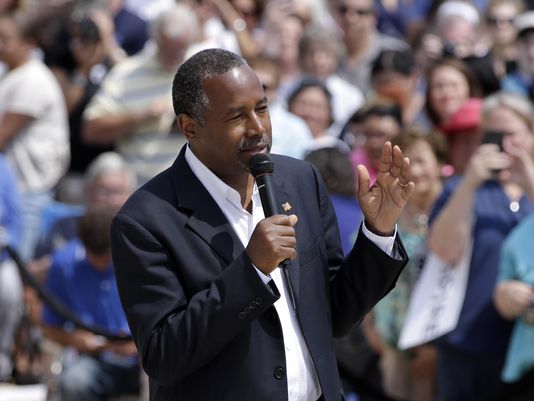Carson’s Restraint May Keep Him from the Top Spot
Carson’s Restraint May Keep Him from the Top Spot

Republican presidential candidate Ben Carson speaks Aug. 27 at a rally in Little Rock, Arkansas. (Photo credit: Associated Press)
By Hannah Hoppe
St. Cloud Times
August 30, 2015
“The first person ever to go under Dr. Ben Carson’s knife … was stabbed by him in school.”
With such an eventful chapter in his childhood history, psychological analysis of pediatric neurosurgeon and 2016 Republican presidential hopeful Ben Carson seems almost disappointing, revealed nothing quite so dramatic. In fact, Carson’s personality profile turns out to be rather unremarkable — for a presidential candidate, that is.
Matt K. Lewis relates the story of Carson’s boyhood stabbing in the Daily Caller (“The time Dr. Ben Carson knifed someone,” June 12, 2014). While psychoanalytically oriented analysts might be tempted to speculate that Carson sublimated — channeled — his deep-seated aggressive impulses into his chosen profession, we won’t go there.
Instead, we conducted a comprehensive empirical analysis of Carson’s character this summer at the College of St. Benedict and St. John’s University’s Unit for the Study of Personality in Politics for insight into Carson’s typical patterns of thinking, acting, feeling, and relating to others — that is, his personality.
Assertive, confident, respectful
The most prominent feature of Carson’s personality profile, as measured by the Millon Inventory of Diagnostic Criteria, is that he has no extreme elevations, in stark contrast to some of his competitors — such as Donald Trump with his spikes on aggressiveness, narcissism and extraversion, or Jeb Bush with his conspicuous scale elevations on conscientiousness and introversion.
In short, Carson’s profile is relatively flat, suggesting a well-balanced, even-keeled personality relatively flexible in the ability to respond adaptively to a broad range of situational demands.
The key drivers for Carson are the dominant/assertive, ambitious/confident, and conscientious/respectful patterns. People with a combination of dominant and ambitious traits are typically characterized as strong-willed, competitive and driven to succeed.
Furthermore, moderately conscientious people like Carson are classically earnest, polite, respectful, principled personalities with a strong work ethic.
Political implications
Despite possessing personality traits that signify fitness to govern, the sedate, composed persona projected by those traits, ironically, entails that Carson likely will find it difficult — unlike, say, Trump — to draw attention to himself and capture the earned media instrumental in elevating a candidate to a position of prominence in the large Republican field.
Given his understated, soft-spoken, unpretentious personality, it’s noteworthy that Carson is one of just three candidates to raise his stock significantly in the Aug. 6 Fox News debate — from 7 percent in the last Fox News GOP preference poll prior to the debate to 12 percent post-debate. (The other stock-raisers were Ted Cruz, from 6 percent to 10 percent, and Carly Fiorina, from 2 percent to 5 percent.)
Carson’s rise is all the more remarkable in view of the fact that he was one of the most overlooked candidates in the debate. According to the New York Times, Carson spoke for just 6 minutes and 48 seconds, compared with 11 minutes, 14 seconds for Trump and only marginally more than Rand Paul, who brought up the rear with 5 minutes and 28 seconds at the mic.
To reiterate, there’s really nothing in Carson’s profile to suggest he should have raised his poll numbers to the extent he did in the debate. For example, like Bush and Scott Walker, he’s quite conscientious, a quality that does not play well with voters (because it makes a candidate seem boring) and not particularly extraverted (which makes a candidate appear animated and engaging).
What lifts Carson?
It’s possible Carson improved his standing in the polls merely by dint of his memorable closing statement, which played well with the audience and received broad coverage in the media — in particular his pithy remark, “I’m the only one (among the presidential hopefuls) to take out half of a brain, although you would think, if you go to Washington, that someone had beat me to it.”
Notably, Carson’s witty rejoinder reflects the self-deprecating, dry humor sometimes found in conscientious personalities; however, along with introversion, that particular personality trait does not play well in retail politics. What does pay dividends in popularity points is a candidate who is publicly perceived as highly dominant, supremely self-confident, and energetically outgoing — which sounds like Trump, not Carson.
Ultimately, our best take on Carson’s rise in the polls is that a good number of voters do, in fact, respond favorably to someone as restrained and unpretentious as Carson. Perhaps not enough to make him king of the hill, but sufficient to lift him to his present perch comfortably at second place in the polls.
This is the opinion of Hannah Hoppe, St. Cloud, a senior psychology major at the College of St. Benedict and St. John’s University, where she is a summer research fellow in the Unit for the Study of Personality in Politics, directed by Aubrey Immelman.

Hannah Hoppe (Submitted photo)
About this series
This is the sixth in an occasional series of personality profiles of most of the Republican candidates in the 2016 presidential election. Hannah Hoppe is a research assistant at the Unit for the Study of Personality in Politics, a collaborative faculty–student research program in the psychology of politics at St. John’s University and the College of St. Benedict, led by associate professor Aubrey Immelman, who specializes in the psychological assessment of presidential candidates and world leaders.
The unit’s summer research program focused on GOP contenders because of the unprecedented number of presidential hopefuls and the unit’s mission to help the public make better informed voting choices. Major Democratic candidates will be profiled next spring.










Follow Aubrey Immelman